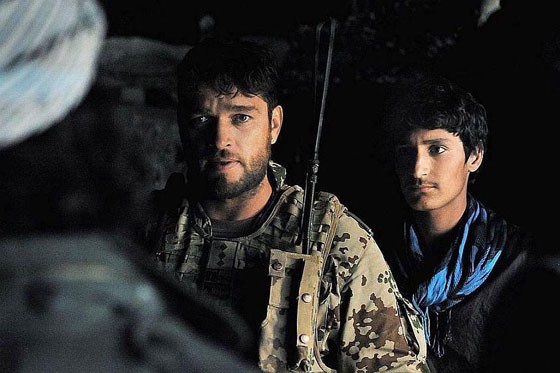Writer-director Feo Aladag’s In Between Worlds was one of four German films to compete for the Golden Bear at this year’s Berlinale. The Vienna-born filmmaker has been a European director to watch since her directorial debut When We Leave was selected as Germany’s entry for the Best Foreign Language Film for the 2011 Oscars.
Earlier this month, I wrote from Berlin, “Aladag takes a huge step forward with In Between Worlds, her second feature. I was very much a fan of her first film When We Leave, which dealt with ‘honor killings,’ but the scope and structure of this film is much larger and more complex. In this work, she ponders issues of masculinity, war, and Germany’s place in a changing world….
“It’s interesting to see a war movie from a female perspective. There are explosions, but it’s really not about the explosions. Rather, it’s about what connects people through war and how soldiers who are told to follow orders at all costs sometimes just can’t do it.”
Aladag answered some questions (by email) about her fascinating new film, why war has become a taboo topic, and the hardest thing about making a film in Afghanistan.
Please
give us your description of your film.
German soldier Jesper signs up for a mission in Afghanistan, despite having
lost his brother during an operation in that war-torn country. Jesper and his
squad are assigned to protect a village outpost from increasing Taliban
influence. With the help of young and inexperienced interpreter Tarik, Jesper
seeks the trust of the local community and the allied Afghani militia. More
than ever, he discovers the immense differences between the two worlds. When
the lives of Tarik and his sister Nala are threatened by the Taliban,
conflicted Jesper is torn between his military obligations and his conscience.
What made you write this
story?
The urge to break the taboo of telling
a story about [active] German soldiers deployed to a war-torn country. Why has there
been no contemporary German movie featuring German soldiers in action? The
Third Reich dominates storytelling in German cinema in regards to Germany’s
soldiers. It seemed time to shift perspective and move beyond the trauma. It’s
vital to communicate, to tell stories, to trigger some sort of dialogue and
empathy by generating options of identification.
Too much of unreflected “United We Stand” makes me shiver, but too little respect for commitment and
bravery makes me feel worse. It somehow seemed unfair to me how the work of
German soldiers was being reflected in German society. This was my starting
point. During the two years of my research on this project I became more and
more intrigued by Afghanistan and its people. The more I educated myself on the
needs of all sides of this conflict, the clearer it became to me where to look
for the core of my story.
Being in between cultures played a big part in the
story, but also in how we created this film. Eventually, we discovered that
there were more similarities than differences on the human level. There was a
lot of respect, loyalty and humor involved in the making of this film. If this
film makes a political statement, it is probably the hope that the sacrifices
on all sides may lead to a somewhat better future for Afghanistan and its
people.
What
was the biggest challenge in making the film?
As a producer: Ensuring cooperation
with the German army via a collaboration with the German and Afghan political
systems and facilitating the biggest possible security for [crew] and cast.
As a writer: Dealing with the
complexity of thematic aspects.
A a director: Shooting in such a
complex shooting environment as Afghanistan.
What
advice do you have for other female directors?
It would be the same advice
I’d also give a male director: Trust your instincts.
Express yourself. Be bold. Be brave. Never — ever — give up. Focus on your vision but always be open — to new ideas, changes and options: be and create
in the moment.
What’s
the biggest misconception about you, as a female director, and your work?
Blonds can’t shoot.
Do
you have any thoughts on what are the biggest challenges and/or opportunities
for the future with the changing distribution mechanisms for films?
The Internet allows smaller films to be
seen by a broader audience, which gives them a valuable platform. On the other
hand, it raises a lot of questions regarding rights that still need to be
solved. Also, it seems that
medium-budget films are getting harder to finance and that what we end up with
are very low-budget ones or big-budget blockbusters. It’s vital to also have
the medium-budget films and keep theatrical distribution of those alive.
Name your favorite women directed film and why.
I don’t have one particular favorite film either by
a female or a male director, but rather many films that I love and which
influenced me in my work and life. But if I had to name some films directed by
women which impressed me more than others, they would be Claire Denis’ Beau Travail, Chantal Akermann’s Jeanne Dielman, Magarethe von Trotta’s Die Bleierne Zeit [Marianne and Juliane], and Susanne
Bier’s Efter brylluppet [After the Wedding] because of how these directors approached their characters in those films and
the long-lasting moments they create in their work.







